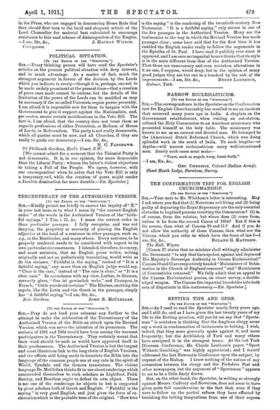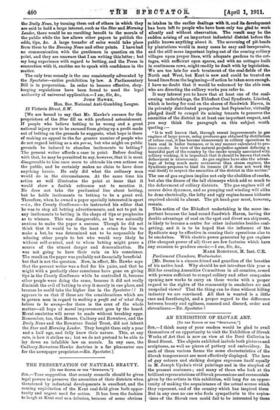BETTING TIPS AND ODDS.
[TO THE EDITOR OF THE "SPECTATOR."] SIR,—As I used to read the Spectator nearly forty years ago, and I still do, and as I have given the last twenty years of my life to the Betting question, will you let me say that " Sports- man " is mistaken in thinking that the Anglican clergy never say a word in condemnation of incitements to betting. I wish, indeed, that they more generally spoke against it, and more frequently; but the Archbishop of York and many others have arraigned it in the strongest terms. At the last York Diocesan Conference, Mr. Claude Leatham's paper, "Sport Without Gambling," was highly appreciated ; and I myself addressed the last Newcastle Conference upon the subject, by request of the Bishop. I know nothing of the nature of any connection between the clergy and the Yorkshire Post and other newspapers, but the argument of " Sportsman " appears to me to be a little finely drawn.
But, on the other hand, the Spectator, in writing so strongly against Messrs. Cadbury and Rowntree, does not seem to have given quite full consideration to the fact that, even if they were to follow up the partial reform they have effected by banishing the betting temptations from one of their organs, the Daily News, by turning them out of others in which they are said to hold a large interest, such as the Star and Morning Leader, there would be no resulting benefit to the morals of the public while the law allows other papers to publish the odds, tips, &c. A large transfer of sales would take place from them to the Evening News and other prints. I have had no communication with the gentlemen in question on the point, and they are unaware that I am writing this letter ; but my long experience with regard to betting, and the Press in connection with it, enables me to speak with confidence in the matter.
The only true remedy is the one consistently advocated by the Spectator—entire prohibition by law. A Parliamentary Bill is in preparation. In order to become effective, shop- keeping regulations have been found to need the legal authority of universal application.—I am, Sir, &c., Joint HAWICB,
Hon. Sec. National Anti-Gambling League.
13 Victoria Street, S.W.
[We are bound to say that Mr. Hawke's excuses for the proprietors of the Star fill us with profound astonishment.
If people who believe betting to be wrong and a great national injury are to be excused from giving up a profit made
out of betting on the grounds he suggests, what hope is there of making an appeal to the far greater number of people who do not regard betting as a sin per se, but who might on public grounds be induced to abandon incitements to betting P The present writer affords a case in point. Before dealing with that, he may be permitted to say, however, that it is most disagreeable to him once more to obtrude his own actions on the public, and he certainly makes no claim to have done anything heroic. He only did what the ordinary man would do in the circumstances. At the same time his action so well illustrates the point at issue that it would show a foolish reticence not to mention it. He does not take the puritanical line about betting, but he holds incitements to betting to be a great evil. Therefore, when he owned a paper specially interested in sport —i.e., the County Gentleman—he instructed his editor that he was to stop all betting advertisements, and not to put in any incitements to betting in the shape of tips or prophecies as to winners. This was disagreeable, as he was naturally anxious to make the paper a success. Though he did not think that it would be in the least a crime for him to make a bet, he was determined not to be responsible for nducing other people to bet who would very likely be without self-control, and to whom betting might prove a source of the utmost danger and demoralisation. He was not going to have their ruin on his conscience. The result on the paper was probably not financially beneficial but that is not the question. Now, in effect, Mr. Hawke says that the present writer was a fool for his pains, and that he might with a perfectly clear conscience have gone on giving tips in the County Gentleman while he controlled it, because other people were doing the same, because it did not really diminish the evil of betting to stop it merely in one place, and because he could take the higher line in the Spectator ! ! It appears to us that if these are the considerations which are to govern men in regard to making a profit out of what they believe to be wrong—for there is the crux of the whole matter—all hope of moral improvement goes by the board. Moral omelettes will never be made without breaking eggs. Remember, too, that Messrs. Cadbury and Rowntree, and the Daily News and the Rowntree Social Trust, did not inherit the Star and Morning Leader. They bought them only a year and a half ago, and fully knew their nature. This, at any rate, is how it strikes us ; but we do not pretend to be able to lay down an infallible law on morals. In any case, the Cadbury-Rowntree-Hawke doctrine is a far pleasanter one for the newspaper proprietor.—ED. Spectator.]











































 Previous page
Previous page